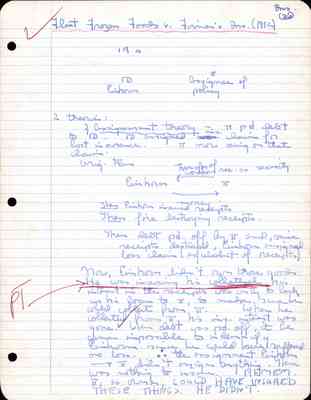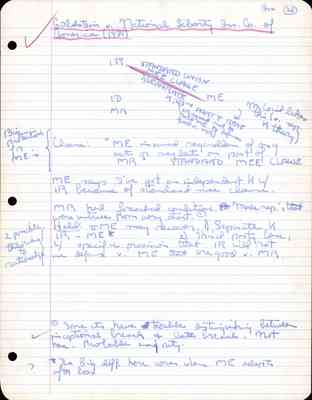Pages
36
Ins. (26) Flint Frozen Foods v. Firemen's Ins. (1952)
IR △
ID π Assignee of Einhorn. policy
2 theories: 1) Assignment theory — π pd. debt to ID. ID assigned ins. claim for lost insurance. π now suing on that claim. Orig. trans
Transfer of warehouse nee. as security Einhorn ← π → money Then Einholm issued receipts Then fire destroying receipts.
Then debt pd. off by π and, since receipts destroyed, Einhorn assigned loss claim (equivalent of receipts)
Now Einhorn didn't own those goods (PT) He was insuring his collateral, his interest in the receipts was only to back up his loan to π, to make sure he would collect from π. When he collected from π his ins. interest was gone. When debt was pd. off, it be— came impossible to indemnify Einhorn since he could would have suffered no loss. ∴ the assignment Einhorn → π didn't assign anything. There was nothing to insure. REMEM. π, as owner COULD HAVE INSURED THESE THINGS. HE DIDN'T.
37
Ins. (27) ✓Conard v. Moreland (1941)
IR
collision "as int. may in harbor appear"
ID go through ID ME ID destroyed sub. rights! NO RECOVERY!
Moreland M'07
(Destruction of IR's subrogation right) ID brought tort action & got sub. settlement ME suing for his interest. ID's action by suing tortfeesor & collecting, this destroying IR's subrogation rights.
Held: ME subject to same defenses as are good v. ID. This true under 3rd party [bene.] and assignee theories. NO RECOVERY FOR ME!!
38
How about subrogation of IR to ME's rights once IR has pd ME under this claim:
IR pd MR — — — ME IR??
Subrogation should be allowed. MR has breached K & is not really an insured even though it's his own policy.*
*If inceptional breach by MR, you've fucked yourself on 3rd party bene. theory, because you didn't have K to begin w/. If subsequent breach, still got K.
39
Ins. (28) ✓ Goldstein v. National Liberty Ins. Co. of America (1931)
IR STANDARD UNION MEE CLAUSE 1) SEPARATE ME McCoid likes k; 4) 3rd PARTY BENE this (v. sep. ID (IR asked not to K theory) MR hold ME to defenses good v. MR)
(Big protection for ME is) Clause: "ME insured regardless of any act or neglect on part of MR." STANDARD MEE CLAUSE
ME says I've got an independent K w/ IR because of standard mee clause.
MR had (...) conditon. Made rep.'s that were untrue from very start. (2 possible theories to rationalize) Held: Π ME may recover. 1) Separate K IR — ME * 2) Third party bene, w/ specific provision that IR will not use defense v. ME that are good v. MR.
Some cts. have trouble distinguishing between ✓ inceptional breach & later breach. Not here. Probable (...).
(?) *The big diff. here comes when ME adopts after loss.
40
Ins. (24) In the Matter of Furture Manufacturing Cooperative, Inc. (1958)
At least ct. seems aware of all alternatives here. This judge is the first one we've seen that knows what he's doing. IR
VR VE (conditional ID no his pol.)
IR never agreed to cover VE's interest in group. Conditional sale —halfway between VR—VE and MR—ME situation. Right in the middle of 2 lines of authority that seem to go in opposite directions.
Held: VE gets benefit of VR's ins.
1) Don't want to let VE get double recovery
(p. 190—202) 2) Loss, as between IR & VE is more appropriately put on IR.




